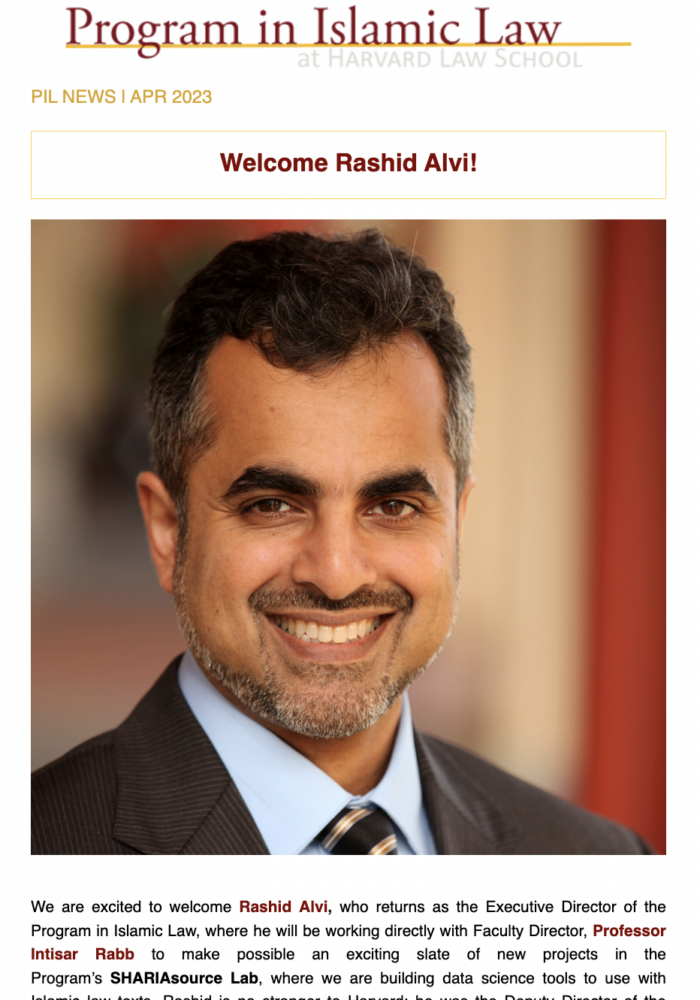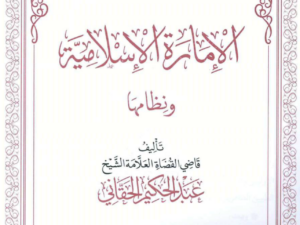
 |
Welcome Rashid Alvi! We are excited to welcome Rashid Alvi, who returns as the Executive Director of the Program in Islamic Law, where he will be working directly with Faculty Director, Professor Intisar Rabb to make possible an exciting slate of new projects in the Program’s SHARIAsource Lab, where we are building data science tools to use with Islamic law texts. Rashid is no stranger to Harvard: he was the Deputy Director of the Islamic Legal Studies Program—PIL’s predecessor ten years ago—and helped launch the SHARIAsource portal. “I’m delighted to return to Harvard’s Program in Islamic Law! I look forward to working with Professor Intisar Rabb and the PIL team to help shepherd PIL and SHARIAsource to even greater heights.” says Rashid. “In particular, I’m eager to work on collaborations with other institutions as we create lasting legacies in the use of digital tools, including machine learning and artificial intelligence, for the study of Islamic law and Islamic studies more generally.” Rashid holds a JD from Columbia Law School, an MA from the University of Southern California, and a BA from Binghamton University. He has served as a chief strategy officer, manager, and deal advisor with strategic, fiscal, and operations leadership. We look forward to working together to fulfill our Program’s mission to promote research and provide resources for the academic study of Islamic law, with the use of digital tools!
|
 |
CONTENT: Al-Imāra al-Islāmiyya wa-niẓāmuhā One aim of SHARIAsource is to provide access to primary sources of Islamic law to support research on salient issues of Islamic law and history. We recently added an excerpt from Al-Imāra al-Islāmiyya wa-niẓāmuhā [The Islamic Emirate and Governmental System] (Dār al-ʿUlūm al-Sharʿiyya, 2022) to our portal. This publication is authored by the Chief Justice of the Islamic Emirate of Afghanistan, ʿAbd al-Ḥākim al-Ḥaqqānī, with a foreword by the current Taliban head, Hibatullāh Akhunzāda. The book discusses governance, education, laws of war (jihād), political leadership, education, and the rights and roles of women. It claims to be a manifesto encompassing the political and governance policies of the Taliban, even though it definitely represents the beliefs of al-Ḥaqqānī and his allies, rather than the philosophy of the entire Taliban movement—which has some internal variation. Explore the excerpt today!
|
 |
CONTEXT: Islamic Law, the Taliban, and the Modern State Last month, Haroun Rahimi (Assistant Professor of Law at the American University of Afghanistan) joined us to present a talk on the “Taliban and Modernity” as part of our Islamic Law Speaker Series. The talk explored the Taliban’s approaches to law, rights, governance, education, and the public and private spheres. He examined what those approaches can tell us about the problems of modernity within Afghan society. He posited that understanding and offering new interpretations of premodern conceptions of separation of powers principles in Islamic tradition could plausibly counter the Taliban’s brand of theocratic authoritarianism. Rahimi also published a related essay on the Islamic Law Blog, titled “Islamic Law, the Taliban, and the Modern State,” His essay addresses the question whether the Taliban can be considered modern and why this consideration is significant. Read his essay and watch his talk today! |

